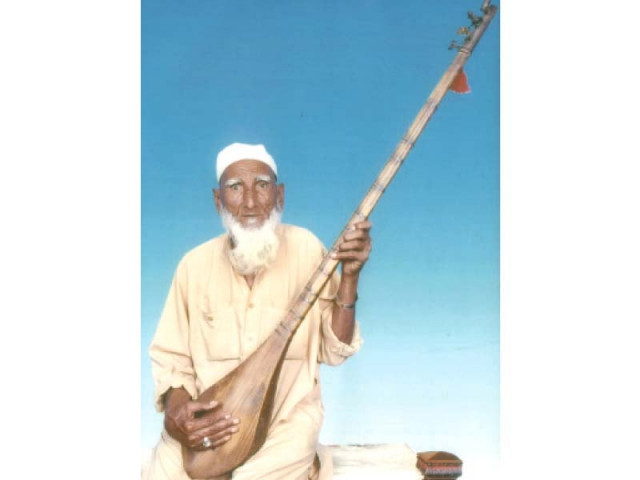Tuned up: In search of the power chords
Nonagenarian sitar player Shad Muhammad talks to The Express Tribune about his journey

Sitar player Shad Muhammad. PHOTO: FILE
Sitting in a bicycle workshop in one of Mardan’s oldest settlements, Babini village, he tunes his Chitrali sitar with shaky hands, the rifle to his soldier. Shad Muhammad today is one of the few living sitar maestros who have mastered the art of playing the Chitrali form of the stringed instrument.
He strums a personal favourite as we talk about his elongated career as a musician. Laughing at the question about his age, he says he has lost count of the years, but is quick to add, “I think I am 97.” Nonetheless, his handshake is still like a carpenter’s clamp.
The workshop belongs to his son and is the only steady source of income for the Muhammad household. He lives close by with his son and three daughters in a mud house that speaks volumes about his state of affairs.
Read: Musical heritage: The last of the sitar makers
Despite losing a leg to cancer and steady hands to old age, the music he plays is still reflective of his prowess. “I started playing the sitar because I felt I could express my feelings through it. The resonance transports me to another world altogether,” he says.
For a moment the conversation drowns into a tune that he plays as we look on at the green fields that surround the shack. Then he pauses, “I decided to devote my life to the instrument.”
Shad Muhammad recollects he didn’t focus on the money through his journey. What mattered was that,“I met famous singers like Bacha Zarin Jan and Dilbar Balelai and collaborated with them.” Before he knew it, sitar playing became a source of income for him.
Recalling Mardan’s music scene from yesteryears, Shad Muhammad says there used to be a community space in the Nehr area where musicians used to entertain audiences pouring in from across the province. “Those were better times. Life was simple and politics had not yet invaded our lives,” he sighs. The sitar player maintains it is impossible to hold such a gathering today. “All such places vanished with time.” He says as the traditions associated with the hujra faded away, so did all forms of art in the area.
Read: NAPA music festival: A contemporary close to a classical opening
Shad Muhammad says his sitar helped him connect with the Creator as he played devotional compositions all his life. “Dama Dam Mast Qalandar was the very first song I played for the radio,” he says, recollecting his visit to Radio Pakistan’s Karachi station. Pashto singer Nisar Muhammad Khan instantly recognised his mettle and brought him to the Peshawar station where he began airing his work regularly. “For over 37 years I have played at the Karachi, Lahore, Quetta and Peshawar stations.” Shad Muhammad is still a regular guest for Radio Pukhtunkhwa, Mardan.
”After I retired from Radio Peshawar, Aman Radio offered me a job for Rs12,000 a month,” he said, adding the pay was reduced to Rs8,000 per month when the service was nationalised. “If the government continues to treat sitar players like this, fewer musicians will take the instrument up in the future; music is essential to keep culture alive.”
Published in The Express Tribune, July 1st, 2015.













COMMENTS
Comments are moderated and generally will be posted if they are on-topic and not abusive.
For more information, please see our Comments FAQ